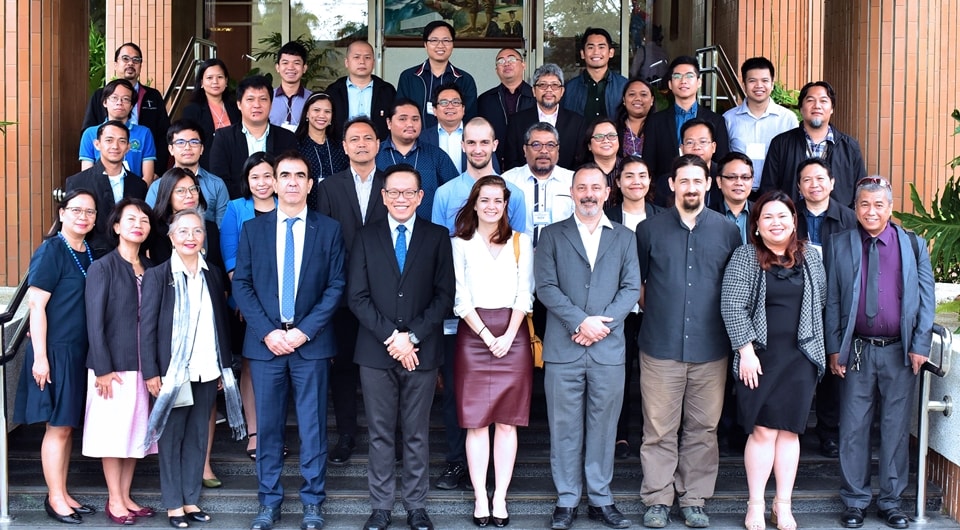Application to environment and agriculture: exploring and designing adaptation strategies against salinity intrusion in the Vietnamese Mekong Delta
Quick Facts:
- 10-14 February 2020
- SEARCA, Philippines
Background and Rationale
One of the goals of current research in computer modeling, especially in the approach known as agent-based modeling, is representing in all its complexity a real system, such as human communities having to adapt to changing environmental or climatic conditions. This is in order to measure the possible evolution of or to design adapted management solutions. Complementary to conventional analytical methods or to sociological surveys, this approach makes it possible to design, incrementally, models whose dynamics are the result of interactions between computer representations of the entities (actors, institutions, environment) of the modeled system. These models then can serve as a support for a "virtual" experimental approach (using simulations) where the resulting dynamics can be studied with all the necessary details, and interaction with the user is encouraged.
The workshop will be organized around a tool, Geographic Information Systems (GIS) and Agent Based Modeling Applications (GAMA), which is an open-source platform dedicated to the development of spatially explicit agent-based applications. It has multiple application domains; uses high-level and intuitive agent-based language; can be driven by agents from any dataset, including GIS data; execute large-scale simulations; and has a declarative user interface.
GAMA was developed by IRD (the French National Research Institute for Sustainable Development) and its partners (http://gama-platform.org) and a tutorial placing trainees in a design position of an adaptation policy against the continuous intrusion of salt-water in the branches of the Mekong River shall be undertaken.
The IRD is a public establishment operating under the joint authority of the French Ministry for Higher Education, Research and Innovation and the French Ministry for Europe and Foreign Affairs. It has a huge network and is present in around 50 countries. It takes an original approach to research, expertise, training, and knowledge-sharing to benefit countries and regions that make science and innovation key drivers in their development (https://en.ird.fr/content/key-stakeholder-sustainable-development-science).
The IRD has provided training to universities in the Philippines, including the University of the Philippines Diliman (UPD), Ateneo de Manila University (AdMU), and UP Cebu. During the Forum on Reducing Disaster Risk towards a Resilient Agriculture Sector held on 29-30 August 2019, organized by SEARCA in partnership with the Embassy of France in the Philippines, the IRD made an initial presentation on GAMA. SEARCA and participants from UPLB picked up on the technology, which can be useful for environment, agriculture, forestry, land management, disaster risk reduction, and a host of other applications.
Objectives
The training workshop will enable the participants to:
- Discover and understand environmental threats through the design of models of increasing complexity under different economic or climatic scenarios and adaptation planning; and
- Build on these models to explore and compare realistic strategies of adaptation at the individual, collective, or institutional scales.
Intended Participants
Invited participants will include UPLB faculty members, researchers, and graduate students from the following colleges/schools: Forestry and Natural Resources (CFNR), Arts and Sciences (CAS), Environmental Science and Management (SESAM), and Agriculture and Food Science (CAFS) who are currently or will be working on modeling/simulation in their respective fields of specialization.
Expected Outcomes
The workshop aims to come out with capacitated learners possessing knowledge and basic understanding of the methodological steps in GAMA modeling beyond the transformation of a research question into a computer model and the way in which computer models can be used to address research queries.
Likewise, it is expected that workshop will strengthen the network of modelers in UPLB, who could be tapped to work on relevant problems towards the sustainable development goals.
Methodology
During the five-day training workshop, the participants will work on a concrete case study (the last planning period from 2000 to 2010 for Thanh Phu district, Ben Tre province, in the Mekong Delta). The case demonstrates profound differences between the planned forecasts for 2010 and the current land cover maps in the same year and applying GAMA modeling will enable them to: (1) understand the reasons for this shift; and (2) correct it by building a model that takes into account various socio-environmental factors, and in particular farmers' behaviors and expectations regarding environmental threats, in this case, seawater intrusion.
Part of the workshop will be devoted to the design and writing of these models in groups of four to five participants accompanied by a trainer. However, a major part of the workshop will comprise discussions, using these models as a support, between each group and the trainers. The last day of the workshop will allow participants to propose, test, and compare the different solutions they have designed during the week.
| Day 1 | Day 2 | Day 3 | Day 4 | Day 5 |
|---|---|---|---|---|
| Registration Opening Program and Overview of the Training Workshop Group Photo Session 1: Climate change and land-use planning in the Mekong Delta Session 2: Introduction to GAMA (1) Session 3: Introduction to GAMA (2). Modeling with the Schelling’s segregation model. Cocktails and Welcome Dinner | Recap of Day 1 Session 4: Modeling with GAMA (1). Land use model (environment: parcels, salinization) Session 5: Modeling with GAMA (2). Land use model (farmers: decision, interactions) Session 6: Modeling with GAMA (3). Land use model (scenarios, indicators and experiments) Session 7: Presentation and choice of "hands-on" projects | Recap of Day 2 Session 8: Group work, definition of objectives and planning of "hands-on" activities Workshop 1: Group work on "hands-on" projects Session 9: First Plenary Presentation of Workshop Outputs (per group) | Recap of Day 3 Workshop 2: Group work on "hands-on" projects Session 10: Second Plenary Presentation of Workshop Outputs (per group) | Recap of Day 4 Workshop 3: Group work on "hands-on" projects Session 11: Plenary presentation of model outcomes per group Wrap-up Evaluation Closing Program |
News
SEARCA, IRD organize training workshop on agent-based modeling using GAMA platform

